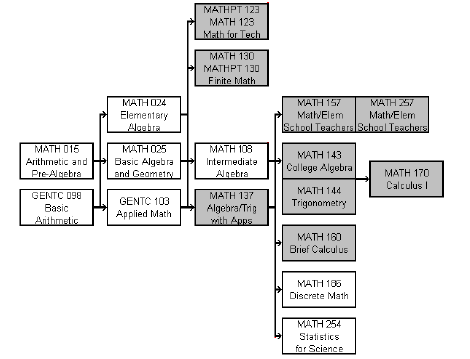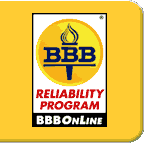Purpose.
Successful completion of this course is sufficient preparation for College
Algebra (MATH 143),
Trigonometry (MATH 144), Precalculus (MATH 147), Brief Calculus (MATH 160) or
Math for
Elementary Teachers (MATH 157). This course does not meet the math skills
requirement of the
general education core curriculum. This course is not a review or preparation
for Finite Math
(Math 130) or Algebra and Trigonometry with Applications (Math 137).
Description.
Intermediate algebra builds on the fundamental concepts introduced in elementary
algebra. This
course emphasizes the concepts of function, domain, range, and zeros and
includes the study of
linear , absolute value, quadratic, logarithmic, exponential, radical , and
rational functions,
expressions and equations . Other topics include complex numbers, composition of
functions,
inverses of functions, properties of logarithms , exponent rules, systems of
equations , and Gauss
Jordan elimination using matrices . A graphing calculator is used extensively.
Methods of Instruction.
Concepts and skills are introduced through reading, group exercises and whole
class instruction
and practiced in homework exercises completed outside of class. You are expected
to learn
independently and should plan on spending at least 8 hours a week outside of
class completing
assignments and studying for quizzes and exams.
Prerequisites.
MA 24 or 25 (C or better) or Math ACT score ≥ 19 or Quantitative SAT score ≥ 440
or
COMPASS Algebra score of 41 - 61. Successful completion of high school
mathematics
coursework does not substitute for the former prerequisites.
Text. Intermediate Algebra, Bracken and Miller.
Calculator. A scientific calculator such as a TI-30XA (not a graphing
calculator) is required
at every class and cannot be shared. A Voyage 200 calculator will be signed out
to you after the first test. If it is not returned at the final exam or if you
drop the
class, a hold will be placed on your records and you will not be permitted to
register at LCSC.
Other. Graph paper; stapler.
If course adaptations or accommodations are needed because of a disability, if
you need to make
me aware of emergency medical information, or if you will need special
arrangements in case of
building evacuation, please contact me as soon as possible or by the 10th day of
the semester. If
you have received accommodations that include taking tests in an alternative
environment, you
are responsible for making an appointment to do so in the Office of Student Life
(Reid Hall,
792-2211). You may audiotape any part of class.
You are expected to monitor your LCMail e-mail student account for class
announcements, even
if you do not own a personal computer or have an Internet connection at home.
Computer access
is provided for all students on campus.
If extraordinary circumstances that occur during the semester make it impossible
for you to meet
the requirements of the course, contact me in person or by phone during office
hours or by
appointment or send an e-mail. If you do not successfully complete course
requirements or
drop/withdraw from the class, you will receive a grade of F.
The last date to drop this class without a permanent entry on your transcript
is Sept
8. The last date to withdraw from this course with a W on your transcript is Oct
31.
After that date, withdrawal is permitted only by petition and approval by the
division chair . The division chair requires documentation of extraordinary
circumstances that prevented you from withdrawing by Oct 31.
You will receive a semester grade based on your final average using this grade
scale:
| A |
A- |
B+ |
B |
B- |
C+ |
C |
D |
F |
| ≥92% |
≥90% |
≥88% |
≥83% |
≥80% |
≥78% |
≥70% |
≥60% |
<60% |
Your semester grade depends on homework (20%), six tests
(55%), group work and class
participation (5%), final exam (20%), and passing of all mastery skill quizzes.
The final exam is
required.
Daily Homework: 20% of your semester grade No late work is accepted.
Homework is collected each day at the end of class and must include a completed
assignment
sheet. It is your responsibility to make sure that you are doing the problems
correctly; answers
for most homework problems are found in the text. Only selected problems are
graded. It is your
responsibility to ask for help. We will spend almost no time on homework
problems in class.
You can get help from me during office hours, during the 15 minutes after class
in the classroom,
or from the tutors in the Math-Science Tutoring Center (also known as the “Math
Lab”).
Even if you have a good reason for missing class or not having homework done,
late work is
not accepted. You should still complete the assignment and check your
answers. The three
lowest homework grades earned during the semester will be dropped at the end of
the semester.
This allows you to receive a 0 on three homework assignments during the semester
without
affecting your grade. Save these three “free assignments” for illness or
emergencies.
If an extraordinary circumstance comes up in your life that will prevent you
from completing
homework for more than three class periods, please talk to me individually
during office hours or
make an appointment. Special arrangements can be made in extraordinary
circumstances.
6 Tests: 55% of your semester grade
No retakes. If you need an alternative test environment, please talk to me
during office hours or
via e-mail. Make up tests are allowed only if you contact me by 11:30 am of the
day of the test
by phone or e-mail with an acceptable excuse for missing the test. Acceptable
excuses do not
include oversleeping, change in work schedule, or mild illnesses. If you cannot
reach me
directly, leave a detailed message.
Investigations, Labs and Class Participation: 5% of semester grade
Group investigations and activities will be completed in class and cannot be
made up.
Final Exam: 20% of your semester grade
The final exam is required and is comprehensive. Do not make travel or work
plans which require
you to take the final exam early.
Mastery Skill Quizzes
Every skill quiz must be passed to pass this class. If you have even one
skill quiz that is not
successfully completed by the end of this class, you will fail this class.
If you make a mistake
on the quiz, you will retake it at the end of a later class or during office
hours. Retakes are not
given on the same day that you get the quiz back. If you are absent and miss a
skill quiz, just
complete the retake during regular class time. If you retake a quiz that you’ve
already passed and
you fail it, you must retake it again until you pass it again. All other papers
must be completely
cleared from the desk when completing a skill quiz. Carefully note whether a
calculator is
allowed. No sharing of calculators is allowed. Cheating is absolutely
unacceptable and is a
violation of a violation of the student code of conduct.
Expectations for Classroom Behavior.
• Be on time.
o It is better to attend for even ten minutes than to miss class. I will not
embarrass
you if you enter late. If we are doing a group exercise, do not expect the group
to
wait for you or help you to catch up. You will not earn the points for the group
exercise if you arrive too late.
• Do not interrupt the learning of others.
o You may quietly leave the room to use the bathroom or to get a drink of water.
Cell phones and pagers should be turned off or in vibration mode.
o Do not conduct social conversations with other students while I am lecturing.
However, you should feel free to ask questions at any time during lecture.
o Do not do your homework during class. This distracts other students.
o Bringing children to class should be avoided.
Academic Dishonesty:
According to the Lewis-Clark State College Student Code of Conduct found in the
Student
Handbook, cheating or plagiarism in any form is unacceptable. All work submitted
by a student
must represent his/her own ideas, concepts and current understanding. Academic
dishonesty
includes cheating, fabrication, helping others to cheat, and plagiarism.
Examples of academic
dishonesty include looking at previous skill quizzes or notes during a skill
quiz, allowing
someone to copy your homework, telling someone in the afternoon section about
the test in
the morning section, submitting answers from the back of the book instead of
actually doing
the problems, copying someone else’s work on a test or skill quiz, or using a
calculator when
told not to do so. Collaborative homework is acceptable as long as all the
participants fully
participate in the work. Students are encouraged to work together on homework
and to study
together for exams. There is a clear difference between collaboration and
copying.
Academic dishonesty in this course will result in a grade of F and the
code of conduct
violation will be reported to the appropriate administrative office for further
action.
Math Placement
| ACT Math |
SAT Quant |
COMPASS |
Course |
| 1-15 |
200-380 |
Pre-Algebra 0-45 |
MATH 015 Arithmetic and Pre -Algebra |
| 16-18 |
390-460 |
Pre-Algebra 46-100 |
Algebra 0-45
MATH 024 Elementary Algebra
MATH 025 Basic Algebra and Geometry |
| 19-36 |
470-800 |
Algebra 46-100 |
MATH 108 Intermediate Algebra
MATH 123 Mathematics for Technology
MATH 130 Finite Mathematics
MATH 137 Algebra/Trig with Applications |
| 23-36 |
550-800 |
Algebra 61-100 |
MATH 143 College Algebra
MATH 157 Math/Elem School Teachers
MATH 186 Discrete Mathematics
MATH 254 Statistical Methods/Sciences |
| 27-36 |
630-800 |
College Algebra 51-100 |
MATH 144 Trigonometry
MATH 160 Brief Calculus |
| 29-36 |
660-800 |
Trigonometry 51-100 |
MATH 170 Calculus I |
LCSC Mathematics Course Flow Chart
Courses which fulfill the Math Skills Component are shaded.
MATH 157/257 meet the Math Skills Requirement as a pair only.
MATH 143/144 meet the MATH Skills Requirement as a pair only.




